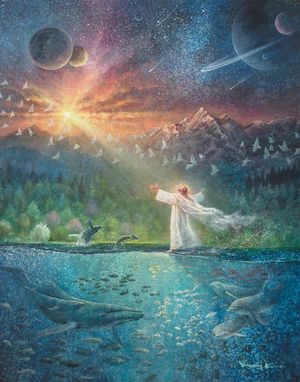Franciscan Fractal
Contemplating Today’s Culture through the Eyes of St. Francis & the Life of Christ
“Re-Visioning Christ”
“Now may our Lord Jesus Christ himself and God our Father,
who loved us and through grace gave us eternal comfort and good hope,
comfort your hearts and strengthen them in every good work and word.”
2 Thessalonians 2:16,17
Jesus Christ! Surprising as it may be, Christ is not Jesus’ last name. Speaking of Christ is to acknowledge another dimension of reality. Jesus, the human person, was a life-giving participant with Christ.
We may first have heard the term “Christ” used with the birth of Jesus. However, Christ existed long before Jesus' birth, and even before the creation of the world. In the Gospel of John, we read, “In the beginning was the Word, and the Word was with God, and the Word was God. He was in the beginning with God.” (John 1:1,2)
The Apostle Paul also writes, “He is the image of the invisible God, the firstborn of creation, for in him all things in heaven and on earth were created, things visible and invisible . . . He himself is before all things and in him all things hold together.” (Colossians 1:15-17)
Christ eternally flows from God the Creator, and does so through the outpouring of God’s love. Out of this active and dynamic relationship between God the Creator and Christ the Son, God’s love becomes uniquely visible in Jesus the Christ.
The term “Christ” has far wider implications than many of us realize. If Christ existed before the birth of Jesus, what then was and is his job? According to St. Paul, God sent forth Christ as a plan in “the fullness of time, to gather up all things in him, things in heaven and things on earth.” (Ephesians 1:9,10)
God’s first intention was to pour out God’s being, which is only love. Christ’s work emanating from God was to spread this love so that it would encompass the entire universe, starting with creation and continuing until the end of time. Love was the agenda. Christ was the action. And, the end promise was, and is, for “everything to become love.”
As part of creation, we ourselves were created also in love; we were created as good in a good world. (Genesis 1:31) Such goodness takes away the need for a Christ whose only purpose was to save us from the sin of Adam. Instead, Christ’s revealed purpose was to show us how to love unconditionally, and to trust God in a world that is still evolving and changing. It is changing because love has not yet completely engulfed all of creation.
When the time in history was “right,” Jesus was born to show what the love of Christ really looks like. Human beings needed a witness beyond their limited experience in order to learn how to love as God loves. They needed a person that they could see, hear, and touch.
Humans also needed Christ – a Christ who comes to each of us with the power to recognize when love is needed personally and in our relationships. Jesus then mentors us by the example of his life. When we are “hit” by another person, we need to learn how “not to hit” back – physically, verbally, emotionally, and mentally. (Hitting others back can be termed, “mimetic violence.”)
There is no need to exact revenge in this world, since in the universe everything – without exception – is directed ultimately toward God’s love. The urge to get “even” needs to die inside each of us, so that love is able to overtake us. Inherent in that love is the ultimate willingness to die to self for the sake of another. And, we do that only by trusting in a God who is moving the universe toward its final destination of completion in unconditional love.
Christ’s work is to pour out God’s infinite love into finite, visible forms for all of creation. Jesus’ work (and ours) is to show us how this infinite love leads us to do the work of healing and proclaiming justice in this world.
How mysterious and how wonderful that our mentors (Jesus and Christ) have joined together to show us how to live, guide, and accompany us on our journey in life!
Prayers and Blessings,
Fr. John


